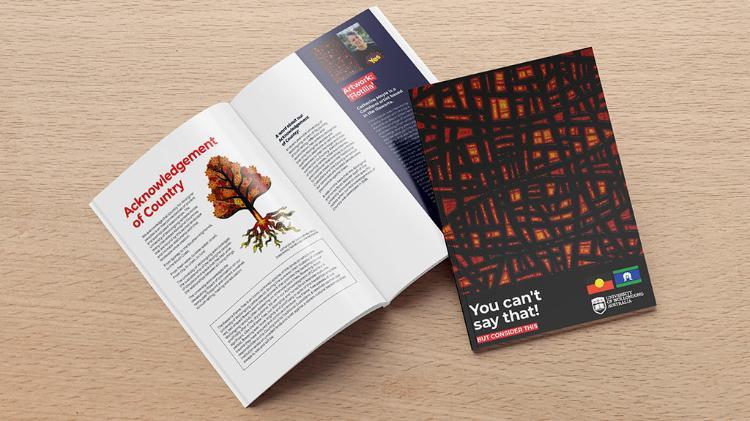The ‘You can’t say that!’ booklet is a terminology guide and educative resource that we can all use to knowingly influence change and introduce appropriate language into the Aboriginal and Torres Strait Islander discourse.
Aboriginal and Torres Strait Islander terminology guide
"You Can't Say that!" terminology guide and educative resource
The resource covers:
- Cultural safety and safety of culture
- Understanding racism
- Responding to racism
- Allyship
- Terminology guide
- Telling the right stories
- Communication and consultation
Why was the resource created?
'You can’t say that!’ was originally developed as a terminology guide in response to UOW student, staff and community feedback about creating safe and respectful communities. The guide included a range of terms that you shouldn’t say, others that require careful consideration, and the reasons why. Language matters, words have power and sometimes those words are used in ways that create unsafe spaces, undermine otherwise respectful relationships and present barriers to meaningful engagement. Often this is unintentional and reflects a lack of understanding or consideration of what different terms mean and the impact they have. Intent does not mitigate or lessen the harm caused though, and the terminology we use can play a significant role in reinforcing the structures and systems of colonisation.
Respectful relationships matter now more than ever, and this resource is the University's contribution to truth telling and healing.
How to reference this resource
You can find detailed instructions on how to reference 'You can't say that!' at the bottom of this page.
We can withstand anything if we align our waka (canoes) through respectful relationships and paddle in the same direction. What would be insurmountable as an individual, we can survive as a collective. More than that, we will all thrive.
You can't say that!
This booklet is a terminology guide and educative resource that we can all use to knowingly influence change and introduce appropriate language into the Aboriginal and Torres Strait Islander discourse. Respectful relationships matter now more than ever. This resource is our contribution to truth telling and healing.
download the booklet (PDF 1.3MB)
How to reference a booklet or pamphlet
The following examples show you how to reference and cite a booklet, brochure or pamphlet using APA7 and Harvard UOW.
How to reference a booklet or pamphlet
The following example shows how to reference a brochure or pamphlet in APA 7. If the author is also the publisher of the work, omit the publisher from the source element. Note the format of the work in square brackets after the title. If it is an online pamphlet, you need to include the web address.
Author, A. or Corporate Author. (Date). Title of work in italic sentence case [Format]. Publisher name if distinct from author. Web address
Reference list entry
Woolyungah Indigenous Centre. (2023). You can’t say that! [Brochure].
https://documents.uow.edu.au/content/groups/public/@web/@pmcd/@smc/documents/doc/uow276312.pdf
In-text citations
Page numbers are optional for paraphrased information but must be included with quotes.
Author Prominent
According to Woolyungah Indigenous Centre (2003),
Information Prominent
It is important to understand the differences between (Woolyungah Indigenous Centre, 2003, p. 3).
Remember that the first time you refer to an organisation you need to use its full name and add the abbreviated form in brackets. Thereafter you can use the abbreviated form:
- According to Woolyungah Indigenous Centre (WIC) (2003)
- According to WIC (2003)
The example below shows how to reference a brochure of pamphlet in Harvard UOW. If the author and publisher are the same, the publisher’s details and location are included. If the brochure is online, include the date viewed (day month and year), and web address.
Author’s last name, Author’s Initial/ Organisation name Year of publication, Title of Pamphlet, format, Publisher, Publisher Location, viewed 5 December 2023, <URL>
Reference list entry
Woolyungah Indigenous Centre, 2023, You can’t say that!, brochure, Woolyungah Indigenous Centre, Wollongong, NSW, 5 December 2023, <https://documents.uow.edu.au/content/groups/public/@web/@pmcd/@smc/documents/doc/uow276312.pdf>
Intext citations
Page/paragraph numbers are optional for paraphrased information but must be included with quotes.
Author Prominent
According to the Woolyungah Indigenous Centre (2021) pamphlet,
Information Prominent
It is important to understand… (Woolyungah Indigenous Centre 2021).
'You can't say that!'
For further details about the resource please contact the Indigenous Strategy Unit
